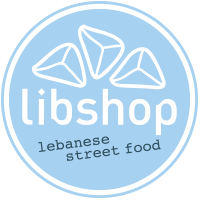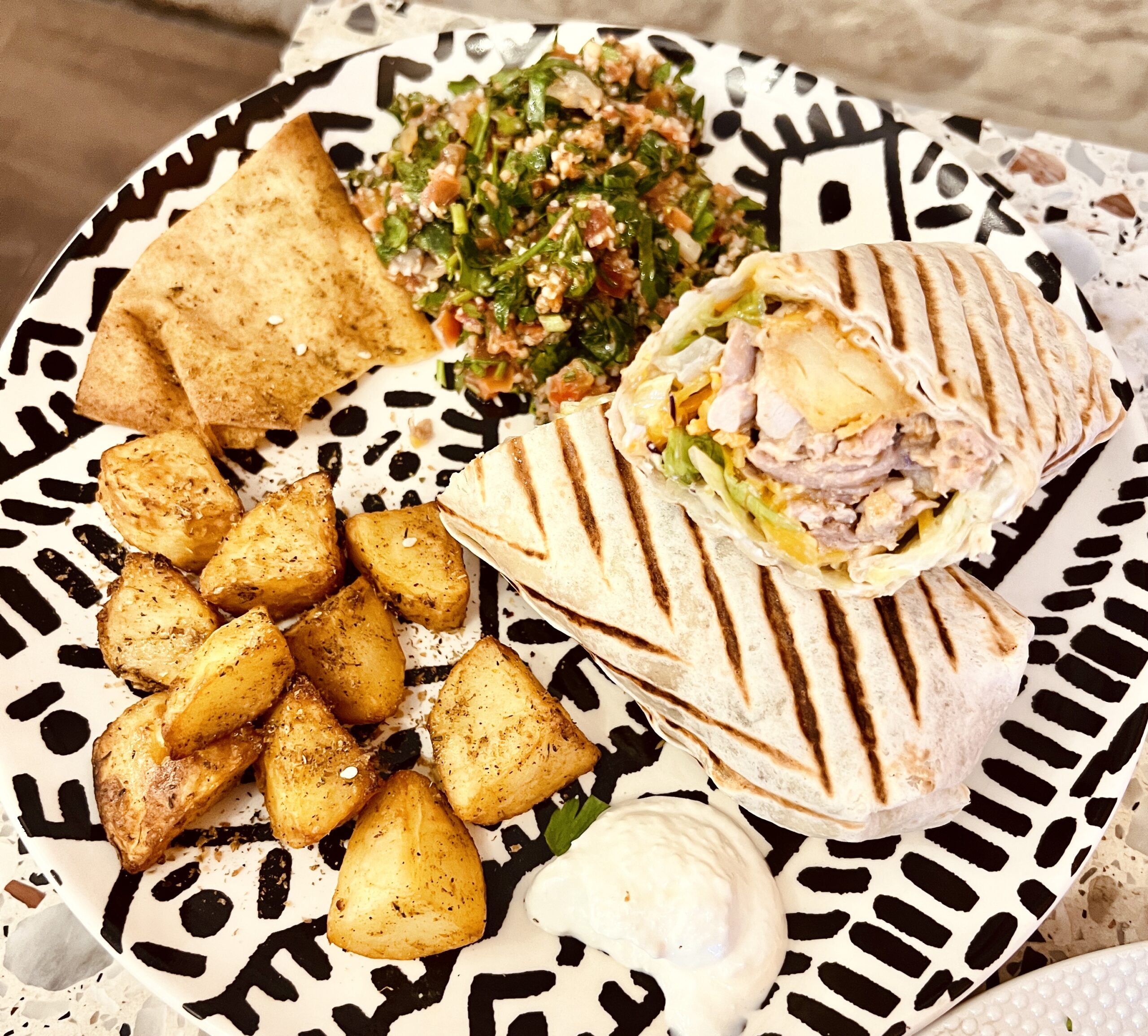Lebanese cuisine, contrary to popular belief, is one of the healthiest cuisines in the world. Discover in this article why and how we decided to get the best out of it for the products we offer on the Libshop restaurant menu.
Is Lebanese cuisine healthy?
When I asked ChatGPT if Lebanese cuisine was healthy, this is what he told us:
Yes, Lebanese cuisine is generally considered healthy. It draws heavily on the mediterranean diet, renowned for its health benefits. Here are some reasons why Lebanese cuisine is perceived as balanced:
- Fresh and natural ingredients : Lebanese cuisine emphasizes the use of fresh vegetables, legumes (such as chickpeas and lentils), aromatic herbs (parsley, mint), and proteins (such as chicken, fish, and lamb). Processed or industrial products are rarely present.
- Plant proteins : Dishes like hummus (chickpeas) and falafel (chickpea or fava bean balls) are rich in plant-based protein, fiber and essential nutrients.
- Cooking with olive oil : Olive oil is an essential base of Lebanese cuisine, making it rich in heart-healthy unsaturated fats.
- Abundance of vegetables : Lebanese mezzes (assorted starters) often include salads such as tabbouleh (parsley, tomatoes, onions, bulgur) and fattoush, which are rich in fiber, vitamins, and antioxidants.
- Spices and herbs : Lebanese dishes are seasoned with spices like sumac, za'atar, and fresh herbs, which help add flavor without the need for a lot of salt, fat, or artificial flavor enhancers.
Thanks to these aspects, Lebanese cuisine is not only delicious but also conducive to a healthy lifestyle, with a balance of protein, fiber, good fats, and antioxidants.
Passionate about sport, nutrition, biohacking and longevity, I have realized over the years that The Lebanese cuisine we cooked every day in Libshop restaurants was actually inherited from the Mediterranean diet, recognized as the world's best diet along with the Okinawan diet for healthy longevity.
✨
At the house of Libshop, we are specialized in the manufacture artisanal of mezzes, shawarma, falafel, Lebanese-inspired dishes and pastries for more than 10 years.
👉 Book your table at one of the Libshop restaurants in Paris
👉 Order Libshop for click & collect or delivery
✨
Find all our health articles on the Libshop Blog!
Unfortunately, Lebanese cuisine and Middle Eastern cuisines have sometimes suffered from a reputation that did not live up to their benefits. They have sometimes been judged to be "too fatty" or "too rich". However, these faults that have been found in them could on the contrary be unsuspected assets.
The futile race for low calories and the hunt for fat
Cutting out fat and eating a low-calorie diet are solutions for health and a healthy weight that are increasingly being questioned today.
In reality, good fats (such as those from olive oil, certain oilseeds, quality meat, offal and small oily fish) are essential for the proper functioning of the body, especially for the brain, hormones and cellular health.
Conversely, a diet that is insufficient in fat and protein, and slightly hypocaloric, the kind of diet that we tend to practice without even knowing it by eating meals that are quite poor in nutrition and by skipping meals, tends to slow down metabolism, and therefore to harm our vitality.
This lack of interest in dense, nutrient-rich foods may ultimately lead to a loss of muscle mass, which we seek to save as much as possible in order to delay aging.
In addition, eating a nutritionally poor diet lacking in protein and essential fats, not to mention micronutrients, can have a dramatic effect to turn off in some way certain vital functions of the body, such as hormonal regulation, mood, vitality and libido.
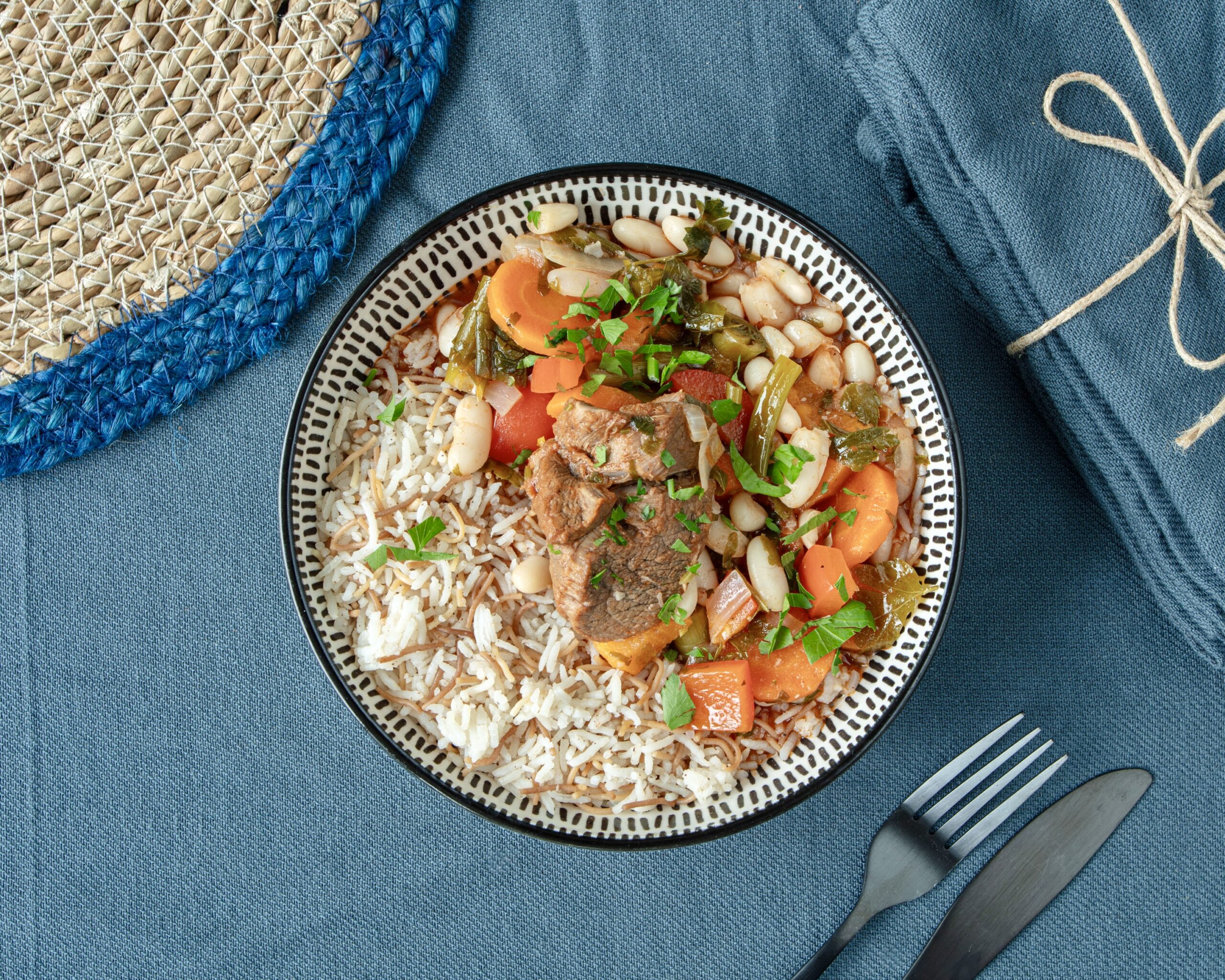
This often leads to weight gain if you have voluntarily followed a low-calorie weight loss diet, and to metabolic imbalances, proving that true balance comes through a diet that is nutritionally dense, including healthy fats and quality proteins, and not through restriction, whether perniciously involuntary, or deliberately excessive!
This is one of the most misunderstood subtleties currently by the general public in the field of nutrition and longevity. And Thinking that a rich and dense meal is an unhealthy meal is one of the biggest mistakes in nutrition..
When we go back to ancestral diets, we realize that human beings consumed both the lean and fatty parts of meat, and even more recently, traditional French cuisine and more generally the cuisines of the different Mediterranean regions show us that Humans have always sought nutritional density, which makes good sense in terms of health, vitality, survival and longevity.
And this way of eating did not prevent our ancestors from being healthy, and from coping with living conditions that were much harsher than today. Their health problems were generally more related to hygiene problems, infections and incurable diseases at the time than to metabolic problems such as those we can have today.
Conversely, nutrition enthusiasts have recently been suggesting that excess refined carbohydrates, hybridized starches, and processed fats are the cause of health problems, mood swings, energy crashes, poor sleep, etc.
In this regard, Lebanese cuisine, but also traditional French cuisine, are among the best cuisines in the world because they are both nutritious, dense and tasty, without being excessively caloric. And the most important thing after a meal is to feel full without having filled yourself with "empty calories". Because there is nothing worse for the body than filling up on energy without getting the micronutrients it needs, and this is what happens when we consume foods that are very rich in energy, but very poor nutritionally speaking.
Important reminder about the new hygiene trend on social networks
Since star doctors and nutritionists have invaded social networks to lecture the public on the consumption of this or that food which is good or bad, one might think that we are witnessing a a gigantic sermon on well-being and healthy eating.
It is important to remember that these dietary injunctions, if they are relevant to public health, should not – in my opinion – not to be taken literally, to the point of becoming obsessed with it. Because it is important to remember – and this is one of the lessons of the Mediterranean lifestyle and the Blue Zones – that Food remains a pleasure too, an opportunity to meet again, or to indulge in a guilty pleasure alone.
When we talk about healthy foods and healthy eating habits, This does not exclude having fun consciously from time to time, and occasional gluttony or a simple festive meal with friends or family has never killed anyone!
It was important to remind people of this so that food does not become a gigantic lesson to apply, and that we also know how to please ourselves from time to time. And treat yourself while staying more or less within the health limits, it's always appreciated, and This is exactly what I'm getting at with Levantine cuisine., and more generally with artisanal cuisines of all kinds and from all regions.
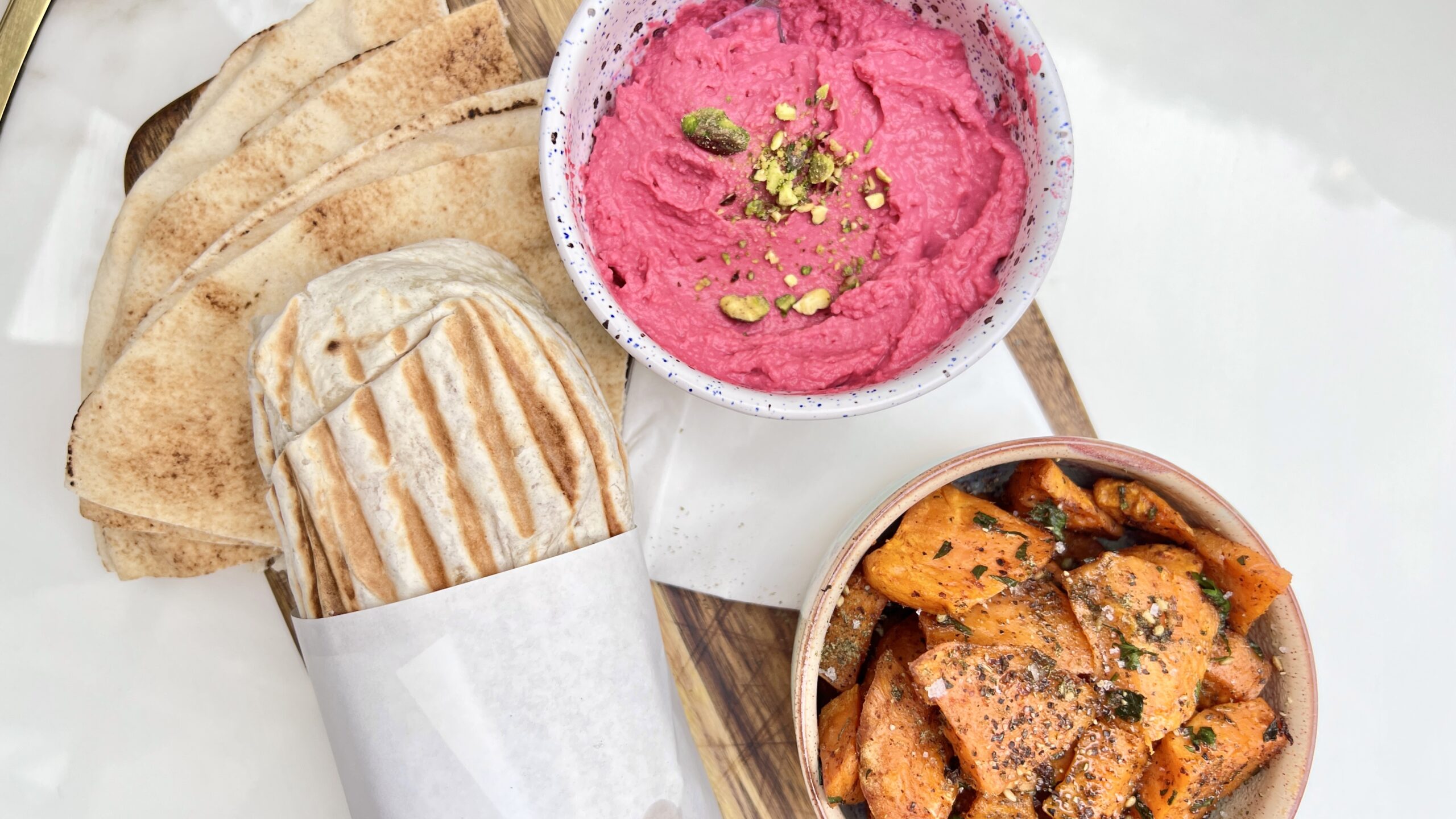
In any case, since we became aware of the asset that Lebanese cuisine could represent, and since we ourselves have benefited from it (-20kg in two years with a Libshop Diet as far as I'm concerned!), we put a point of honor to offer dishes not only tasty but also good for health. Inspired by the Mediterranean diet, and the more recent food movement lowcarb, we develop recipes that combine freshness, nutritional balance, modernity and authenticity.
Discover the 5 Main Benefits of Lebanese Cuisine which you can enjoy at Libshop.
1. Rich in plant and animal proteins
One of the key aspects of Lebanese cuisine is the use of legumes such as chickpeas and beans, as well as marinated meats high quality. At Libshop, our mezzes like the homemade hummus or the Falafel revisited with pumpkin are excellent sources of plant-based protein.
They are perfect for a balanced meal, whether you are vegetarian or not. On the meat side, our meat-based dishes marinated chicken or of beef flank are also very rich in protein, ideal for filling you up while providing you with the energy you need.

Why it's good for you:
- Protein is essential for the development and repair of muscle tissue, and for healthy skin and hair.
- They help maintain a feeling of satiety.
2. Controlled in carbohydrates, perfect for a balanced diet and top health
There Mediterranean diet, which inspired Lebanese cuisine, is naturally low in refined carbohydrates. True, the ancestral Mediterranean diet contains a significant amount of carbohydrates, but these were carbohydrates that came mainly from ancient and unrefined grains, and the people who lived in these "Blue Zones" were mostly active, had physical occupations, and also consumed foods that acted as a sort of buffer against certain carbohydrate-rich foods, or alcohol for example.
The advantage of a carbohydrate-controlled diet is that it allows to avoid energy yo-yos on the one hand, caused by high blood sugar followed by low blood sugar, which leads to food cravings, mood swings and impaired concentration.
On the other hand, it allows to spare the pancreas, and to prevent him from having to secrete insulin constantly in order to bring the ingested glucose into the cells. Because to use the circulating glucose, the cells have insulin receptors, which allow them to capture this glucose and transform it into energy.
In the long term, a diet too rich in carbohydrates and especially in carbohydrates from overly processed foods, has the disadvantage of "wearing out" the insulin mechanism. The cells are thus less and less able to receive insulin signals, and therefore to oxidize glucose. This is what is simply called "insulin resistance", and this phenomenon risks leading to health problems in the long term, and affected longevity. And that's without mentioning problems with fatty liver, chronic inflammation, allergies, etc.
But be careful, limiting glucose does not mean that it should be eliminated, and even less when we don't provide enough good fats, otherwise we risk exposing ourselves to a " energy dead end", translated by the fact that the body no longer knows where to get its energy! When we limit carbohydrates and fats too much, we fall into what we mentioned before, namely chronic low-calorie diet, which is a trap from which it is wise to escape as quickly as possible.
Hence the interest in the Mediterranean diet (but not only), which is a subtle energetic blend between good fats and healthy carbohydrates, in controlled quantities, and in tasty recipes, which were made easier in the Neolithic era by what is called "the fertile crescent", which corresponds to the current Middle East, and more generally today to the entire area surrounding the Mediterranean, whose climate is favorable to quality agriculture and livestock farming.
It is not for nothing that the public authorities recently increased the recommended proportion of fat, after more than 50 years of demonizing fat.
With hindsight, it seems that one of the most effective dietary patterns for health is Mediterranean-lowcarb diet, which in a way brings together the best of both worlds, namely a diet controlled in carbohydrates, an intake of fiber and polyphenols, a sufficient intake of good fats, an intangible intake of proteins and a culinary pleasure maintained at the antipodes of restrictive diets.
It's a bit the most balanced diet in protein/carbohydrates/fats/fibers, while being tasty and fun. Although it is important to specify that there are of course other extremely interesting dietary trends, such as what can be found in the ancestral diet of Northern Europe or Asia for example, and that depending on genetic profiles, tastes, seasons, and what we can tolerate or not on a digestive level, we can mix all that a little.
At Libshop, we favor quality ingredients such as fresh vegetables, relatively lean meats marinated and cooked in the oven, and healthy fats like olive oil, sesame cream, hummus, eggplant caviar, tzatziki… Our dishes, like Blue Bowl, are designed to be moderate in carbohydrates, with an ideal protein/carbohydrate/fat/fiber balance, making them perfect for those looking to adopt a balanced diet while reducing their intake of refined sugars.
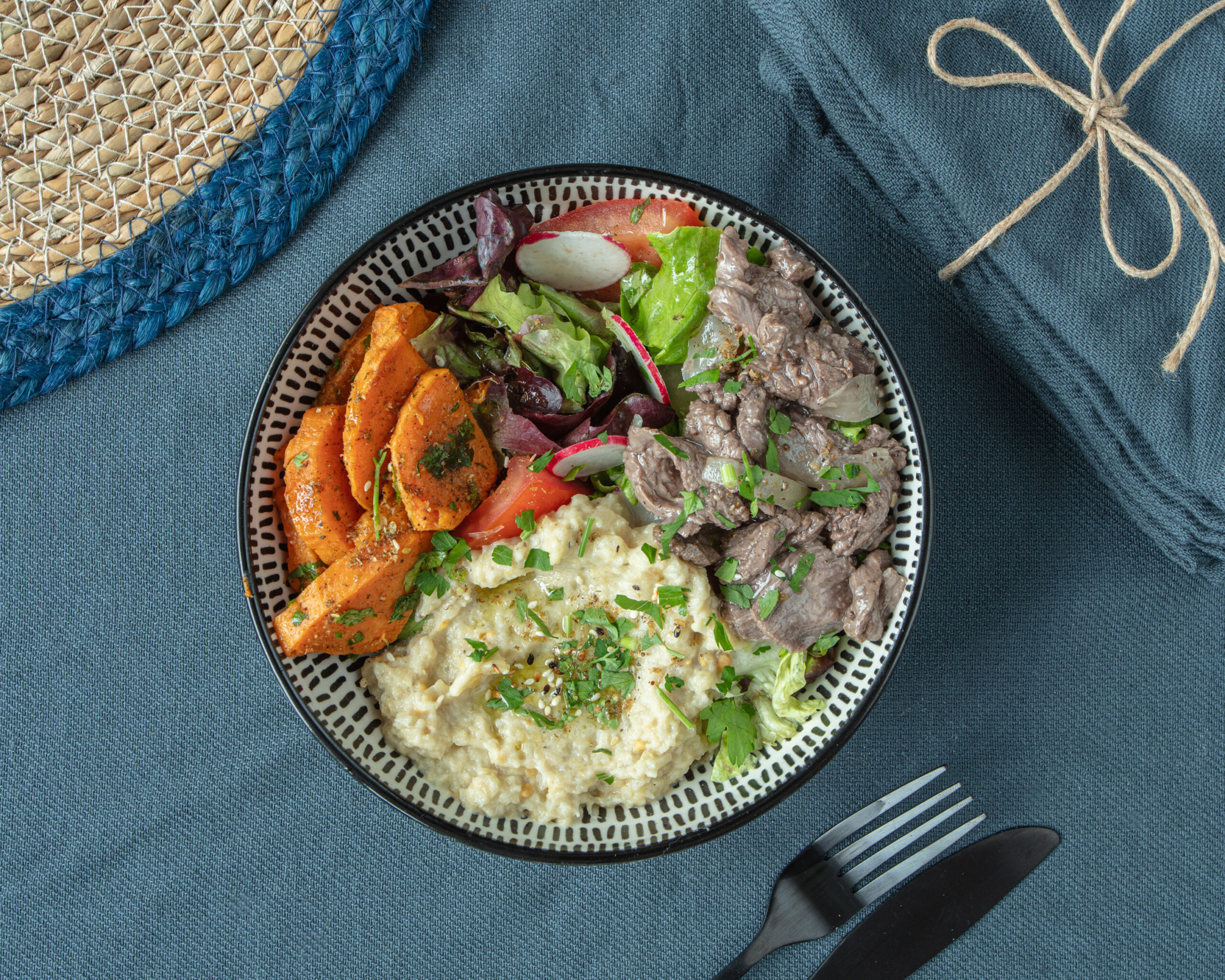
Why it's good for you:
- A carbohydrate-controlled diet can help stabilize blood sugar levels, promote weight loss, and improve healthy longevity.
- It reduces energy fluctuations associated with sugar spikes, helping you stay focused and energized throughout the day.
3. Healthy cooking with olive oil
At Libshop, we exclusively useolive oil to cook our meats and prepare our mezzes. Olive oil is a source of good fats rich in monounsaturated fatty acids, which are beneficial for heart health. Whether in our chicken or beef marinades or in our salads like fattoush, olive oil is a central element of our cuisine, providing both flavor and nutritional benefits.
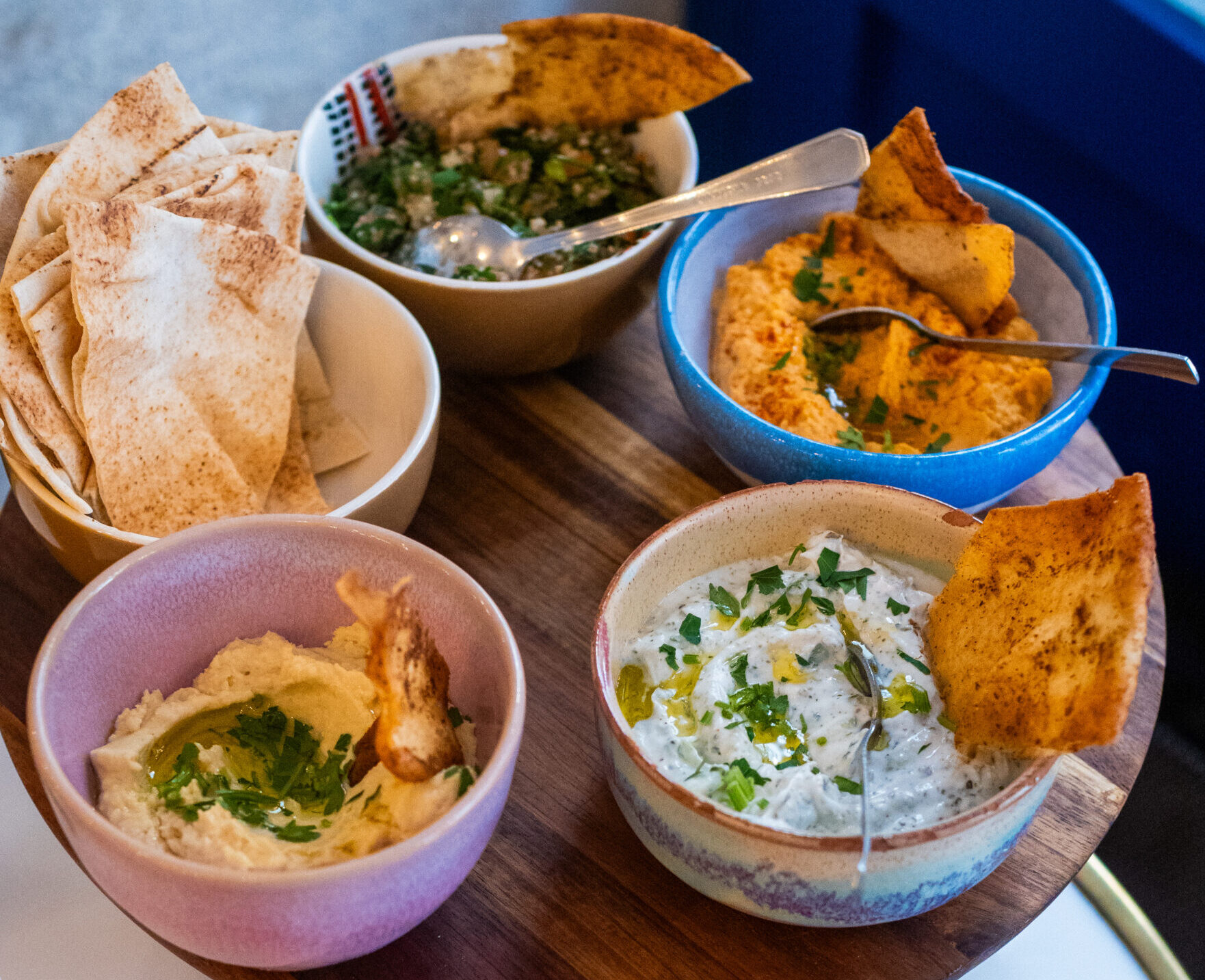
Why it's good for you:
- Olive oil is rich in antioxidants and helps reduce inflammation.
- It helps maintain good heart health.
4. Fiber, spices and polyphenols for good digestion
Lebanese cuisine places a strong emphasis on vegetables and the legumes, which are excellent sources of dietary fiber. Our mezzes like the Lebanese Tabbouleh, THE eggplant caviar or the hummus are not only tasty but also rich in fiber. Adequate fiber intake helps improve digestion, regulates intestinal transit and prevents blood sugar spikes after a meal.
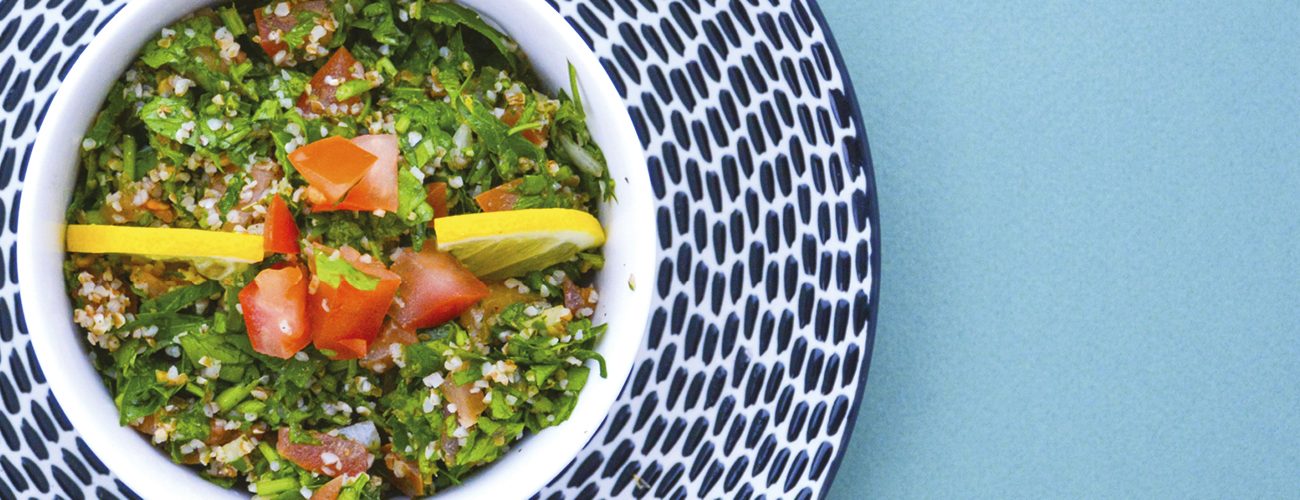
Moreover, to give flavor to the recipes, we use the most ancestral way possible, namely the use of spices, herbs and aromatics. And when we talk about spices, we don't necessarily mean chili peppers, except when it comes to our homemade hot sauce, but rather of medicinal spices which are used for marinades and which allow you to add flavour without having to use too much salt, sugar or other industrial sauces. For example, we use cardamom, cinnamon, pepper, oregano, thyme, cloves, cumin, etc.
Finally, we use garlic both for its taste and for its therapeutic virtues.
All of these foods are not only high in fiber, but also in polyphenols, which are now known to be extremely beneficial compounds for health and longevity.
Why it's good for you:
- Fiber helps maintain healthy digestion, helping you feel full, which can help you better control your appetite.
- Polyphenols can give you a better chance of health.
6. Fresh ingredients for healthy and tasty cooking
At Libshop, we make a point of using fresh ingredients and carefully selected. The vegetables, meats and herbs we use are always of the highest quality, to ensure dishes that are not only delicious but also rich in essential nutrients. Our recipes, like the fattoush salads or the Chicken tagine revisited Lebanese style, are prepared every day from raw and natural products, without flavor enhancers or processed products.
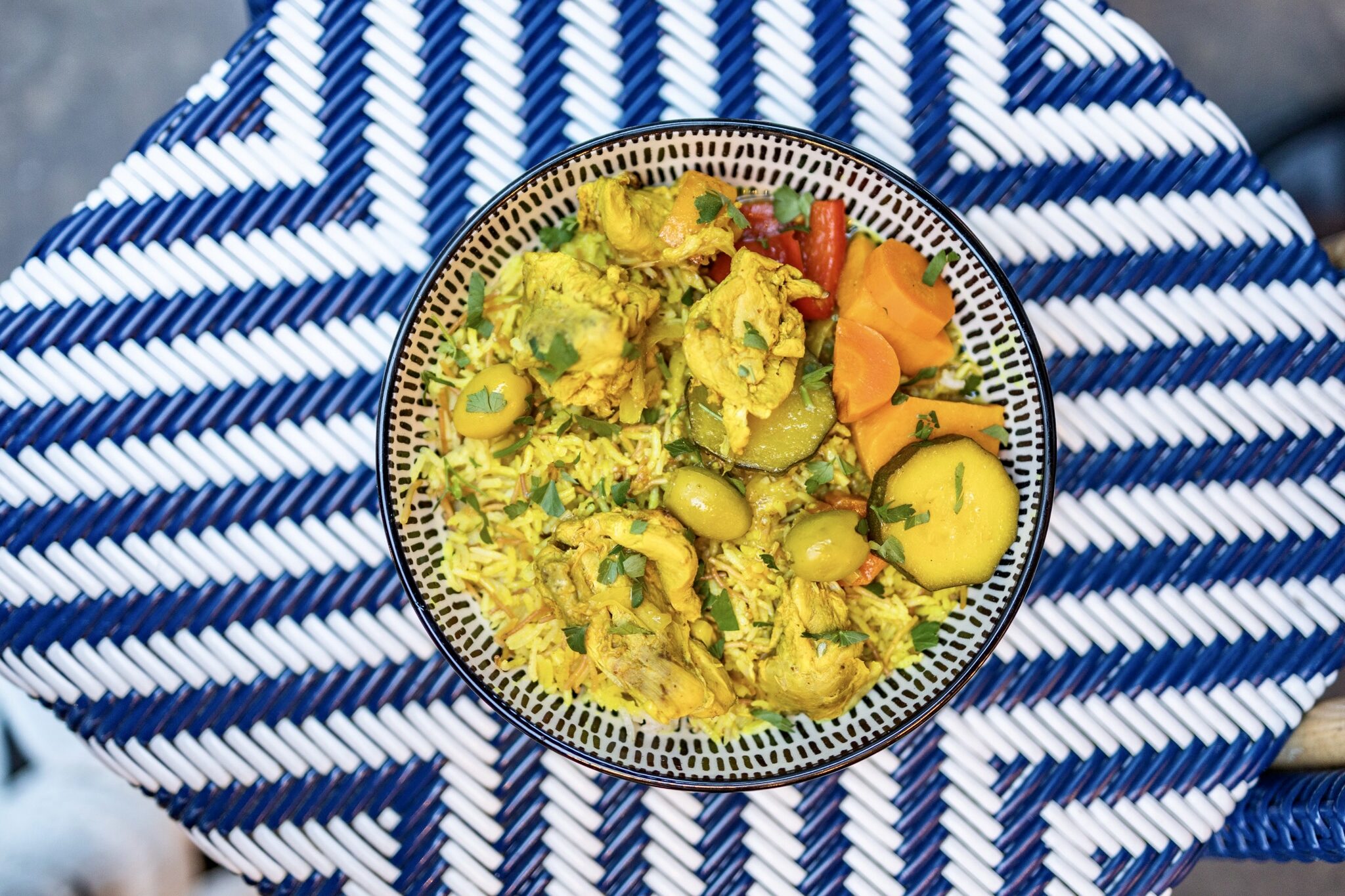
Why it's good for you:
- Fresh ingredients are richer in vitamins and minerals, essential for a balanced diet.
- By avoiding processed foods, you reduce your intake of preservatives and artificial additives that can be harmful to your health.
Discover healthy and artisanal Lebanese cuisine at Libshop in Paris
The Lebanese cuisine that we offer at Libshop combines flavor, tradition and well-being. Whether you are looking to eat healthily, balanced or simply to treat yourself, we invite you to come and discover our artisanal recipes and our dishes inspired by the Mediterranean diet.
Book now in one of our restaurants in Paris 1 or Paris 13 Or take away your menu in our shops Paris 8 And Paris 9 and enjoy dishes that will do you good, while delighting your taste buds!
